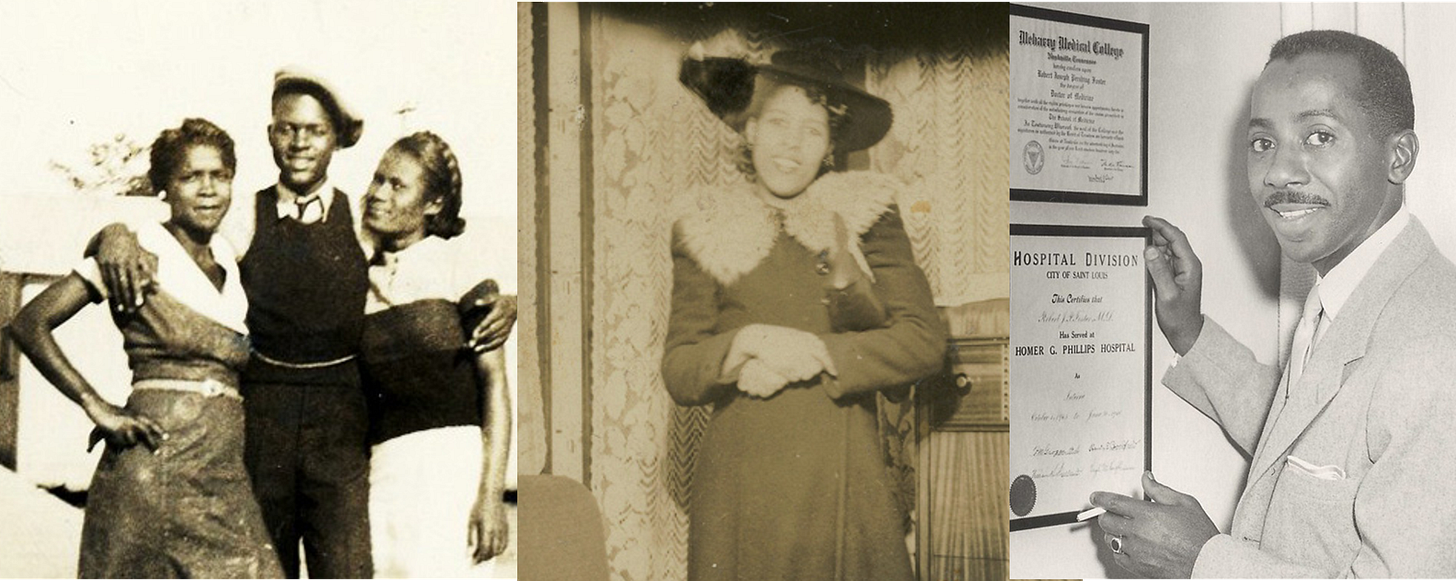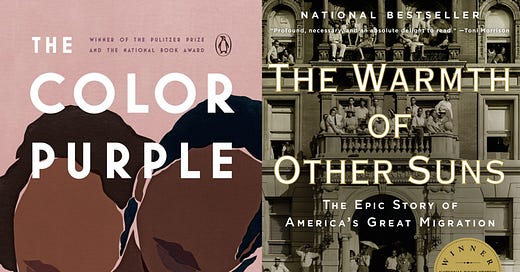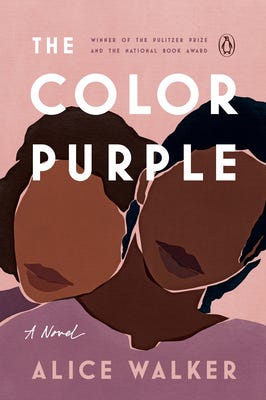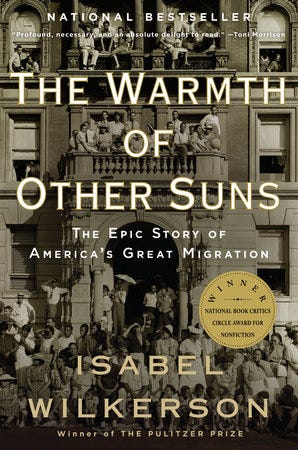The Color Purple and The Warmth of Other Suns
#139: A repost featuring two Pulitzer Prize winners.
Hello, readers —
This post was first published on March 4, 2022 and went out to 74 recipients. There are quite a few more of you now so I’m sending it out again with hope it finds someone who needs it.
I’d love to know if you’ve read either of these books and what you think of them.
The Color Purple by Alice Walker
Pages: 304 | Published: 1982
I think it pisses God off if you walk by the color purple in a field somewhere and don't notice it. People think pleasing God is all God cares about. But any fool living in the world can see it always trying to please us back.
I’m a little speechless about this book. The reading experience was wonderful. I thoroughly enjoyed spending time with Celie, Shug, Sofia and Nettie and was fully invested in Celie’s growth and self-realization. Her character transforms in the most beautiful way, against all odds, thanks to the love and support of those around her. You hardly recognize her as the person from the beginning of the novel.
In a similar way as Their Eyes Were Watching God, this book inserts you into the lives of Black women in the early twentieth century rural south and I found the journey worthwhile. Remnants of that world still exist today which is why it’s important for new generations of readers to discover this book.
The phrase “the least of these” from the Bible comes to mind as I think about some of these characters. While they may not be assigned high value in the rankings of society, the reality is they are “expressions of the divine” and the rest of us can choose to see that.
The Warmth of Other Suns by Isabel Wilkerson
Pages: 549 | Published: 2010
I can’t gush about this book enough. Isabel Wilkerson is insanely talented. The length and subject matter should not intimidate anyone because this book is the definition of readable. From some non-fiction writers I get the vibe that they are flexing - they want you to know they are smart and tend to shine a light on themselves rather than the subject matter. Isabel Wilkerson puts her subjects front and center with all the respect they deserve. Her writing isn’t pretentious or showy in any way. The tone is confident because she really does know her stuff.
There has been some debate lately over what to teach in schools, banned books, and feeling discomfort when it comes to learning about racism. Yet here's this landmark, Pulitzer Prize winning work that has been around for over a decade. Anyone can pick it up and read it. One can get sucked into all the drama online and form opinions based on the uninformed and fear-based opinions of others, or, one can check this book out from the library and take advantage of the dozen+ years of research that went into its creation. Ms. Wilkerson has done the work and it shows on every page. I couldn’t detect a “spin” or “agenda” or even a whiff of bias unless you count bias towards truth. I feel kinda lazy but also highly grateful that all I have to do is read. It feels like I’m taking advantage of the situation.
If you are looking for a thoughtful and rigorous treatment of race relations in the US, this is it. Start here. It spells out conditions in the Jim Crow south and the inner lives and struggles of real people who left their homes looking for something better in the north and west. They bravely left everything they knew behind. That’s how bad it was. And while they found conditions better outside of the south, that doesn’t mean life was without struggle.

I'm baffled and beyond impressed with the time, attention, research, effort, everything that Ms. Wilkerson put into this book. She mentions in the acknowledgments that she pursued it as a calling and she thanked God for the will and fortitude to make it through the journey. I also thank God that she brought this into the world.
In recent months I've been reading my grandfather's personal history and enjoyed spending time in another time and place with a dear loved one. Reading The Warmth of Other Suns has been a similar experience and the three subjects of this book feel real and dear to me. Ms. Wilkerson tells their stories with so much grace. She never puts them on a pedestal - these were real people with real problems who made some poor choices in the same way we all do. But they also made courageous and inspiring choices, worked hard, and made an impact through caring for their families and others.
Theirs are the stories that I want to remember and use as a guide in my own life.
For more on The Color Purple, check out these recent posts from other writers.
Jeremy Anderberg from Read More Books:
I’ve never read anything quite like The Color Purple and doubt that I will again. It’s a uniquely powerful novel that’s incredibly heart-breaking, but also deceptively optimistic and hopeful. It easily deserves a 5-star rating and should be on everyone’s lifetime reading list.
Joel J. Miller from Miller’s Book Review discusses the history of banning The Color Purple and concludes with:
In the hands of a discerning student or thoughtful teacher such a book can…help make sense of suffering. Does that mean students must simply imbibe and adopt Walker’s answers to these problems? No. That’s what thinking is for. Books assist thinking; they don’t do it for us. Or have we forgotten that?
Thanks for reading,
Kyle






Thanks for sharing about "The Warmth of Other Suns!" I bought it a few years ago on my kindle and started reading and never finished--got distracted by audio books. But I've been thinking about it lately and now am going to go back and read it.
Have you read Wilkerson's newer book, Caste? So good too!